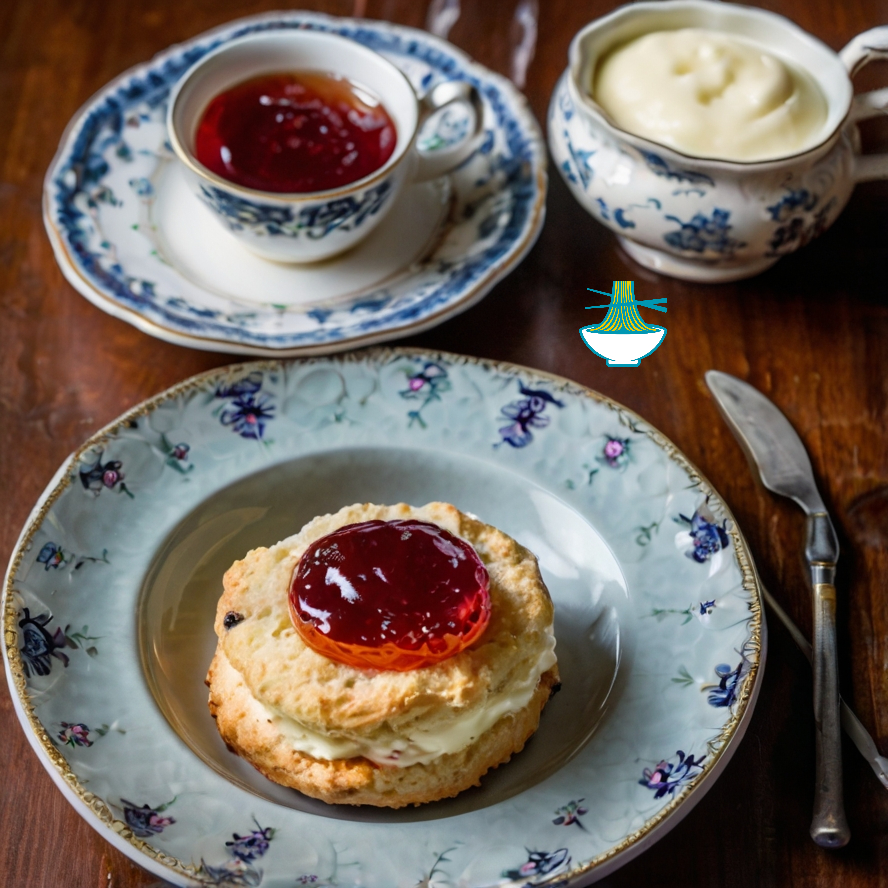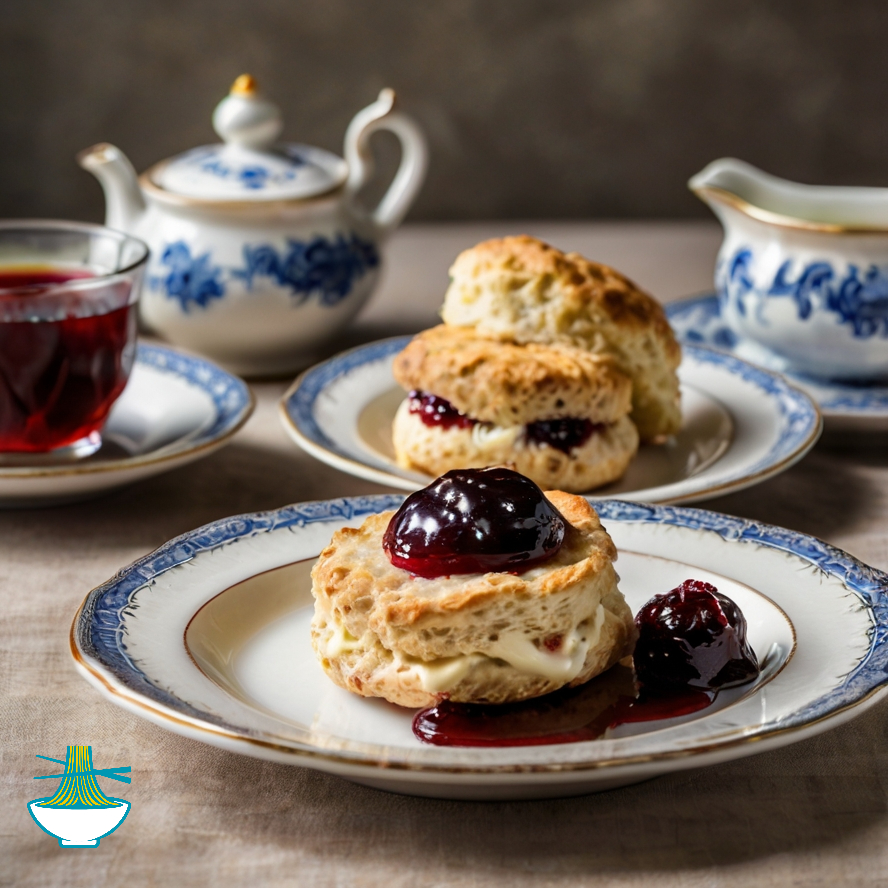British teatime delight: fluffy scones with clotted cream and sweet jam, perfect for afternoon treats or cream teas you can cooking it at home in 15 mins only .

The exact origins of scones are debated, but they are believed to have originated in Scotland or England. The first recorded mention of scones dates back to the early 16th century in Scotland, where they were made with oats and cooked on a griddle. Over time, the recipe evolved to include flour, butter, and other ingredients, resulting in the scones we know today. Clotted cream, a thick cream with a velvety texture, has been produced in Devon and Cornwall for centuries and became a popular accompaniment to scones in the 19th century. The tradition of serving scones with clotted cream and jam became firmly established in British culture and is now enjoyed worldwide as a delightful teatime treat.
Ingredients:
- 2 cups (250g) all-purpose flour
- 1/4 cup (50g) granulated sugar
- 1 tablespoon baking powder
- 1/2 teaspoon salt
- 1/3 cup (75g) unsalted butter, cold and cubed
- 1/2 cup (120ml) milk
- 1 large egg
- Clotted cream and jam, to serve
Method:
1. Preheat your oven to 400°F (200°C). Line a baking sheet with parchment paper.
2. In a large mixing bowl, whisk together the flour, sugar, baking powder, and salt.
3. Add the cold cubed butter to the flour mixture. Using your fingertips or a pastry cutter, rub the butter into the flour until the mixture resembles coarse crumbs.
4. In a separate bowl, whisk together the milk and egg. Pour this mixture into the flour mixture and stir until just combined. Be careful not to overmix.
5. Transfer the dough onto a lightly floured surface and gently knead it a few times until it comes together. Pat the dough into a circle about 1 inch (2.5cm) thick.
6. Using a floured round cutter, cut out the scones and place them onto the prepared baking sheet, leaving some space between each scone.
7. Brush the tops of the scones with a little milk for a golden finish.
8. Bake in the preheated oven for 12-15 minutes or until the scones are golden brown and cooked through.
9. Once baked, transfer the scones to a wire rack to cool slightly.
10. Serve the warm scones with clotted cream and jam.
Enjoy your delicious British teatime treat!
Nutrition Value:
1. All-purpose flour (2 cups / 250g):
- Calories: Approximately 910 kcal
- Carbohydrates: Approximately 190g
- Protein: Approximately 24g
- Fat: Approximately 2g
- Sodium: Approximately 8mg
- Cholesterol: Approximately 0mg
- Vitamins: Contains small amounts of vitamins B1, B2, B3, and folate.
- Minerals: Contains small amounts of iron, magnesium, phosphorus, potassium, and zinc.
- Nutritional benefit: Provides energy from carbohydrates and a moderate amount of protein. Contains some essential vitamins and minerals.
2. Granulated sugar (1/4 cup / 50g):
- Calories: Approximately 200 kcal
- Carbohydrates: Approximately 50g
- Protein: Approximately 0g
- Fat: Approximately 0g
- Sodium: Approximately 0mg
- Cholesterol: Approximately 0mg
- Nutritional benefit: Provides quick energy from carbohydrates but lacks significant vitamins and minerals.
3. Baking powder (1 tablespoon):
- Calories: Approximately 5 kcal
- Carbohydrates: Approximately 1g
- Protein: Approximately 0g
- Fat: Approximately 0g
- Sodium: Approximately 1300mg
- Cholesterol: Approximately 0mg
- Nutritional benefit: Provides leavening agent for the scones, aiding in their rise.
4. Salt (1/2 teaspoon):
- Calories: Approximately 0 kcal
- Carbohydrates: Approximately 0g
- Protein: Approximately 0g
- Fat: Approximately 0g
- Sodium: Approximately 1150mg
- Cholesterol: Approximately 0mg
- Nutritional benefit: Enhances flavor; necessary for proper seasoning.
5. Unsalted butter (1/3 cup / 75g):
- Calories: Approximately 530 kcal
- Carbohydrates: Approximately 0g
- Protein: Approximately 0.6g
- Fat: Approximately 60g
- Sodium: Approximately 1mg
- Cholesterol: Approximately 185mg
- Vitamins: Contains vitamins A and D.
- Minerals: Contains small amounts of calcium.
- Nutritional benefit: Provides fat for flavor and texture, and also contains some vitamins.
6. Milk (1/2 cup / 120ml):
- Calories: Approximately 60 kcal
- Carbohydrates: Approximately 6g
- Protein: Approximately 4g
- Fat: Approximately 3g
- Sodium: Approximately 50mg
- Cholesterol: Approximately 20mg
- Vitamins: Contains vitamins A, D, and B12.
- Minerals: Contains calcium, phosphorus, and potassium.
- Nutritional benefit: Provides protein, calcium, and vitamins for overall health.
7. Large egg (1 egg):
- Calories: Approximately 70 kcal
- Carbohydrates: Approximately 0.4g
- Protein: Approximately 6g
- Fat: Approximately 5g
- Sodium: Approximately 70mg
- Cholesterol: Approximately 185mg
- Vitamins: Contains vitamins A, D, E, and B12.
- Minerals: Contains selenium and choline.
- Nutritional benefit: Provides protein, healthy fats, and essential vitamins and minerals.
8. Clotted cream and jam (to serve):
- Nutritional information may vary depending on the brand and serving size. Generally, clotted cream is high in fat and calories, while jam is high in sugar.
These values are approximate and can vary based on factors such as brand, preparation method, and serving size.


Comments